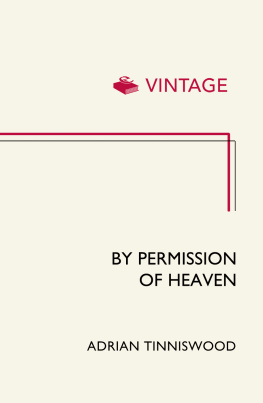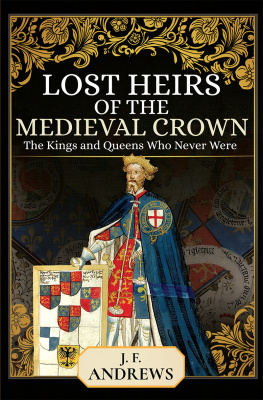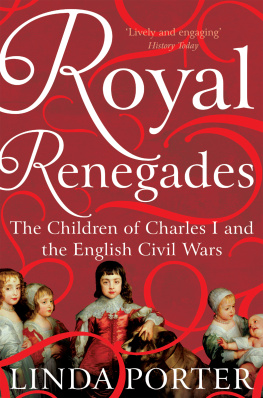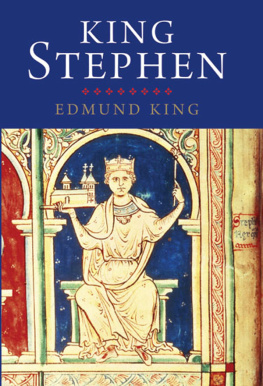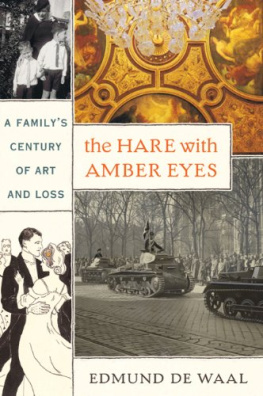PRAISE FOR
T HE V ERNEYS
A lively, almost novelistic account of an aristocratic familyTinniswoods portraits are intimate, compelling, and deftly situated within the broader historical period, so that the turbulence of the seventeenth century is rendered as a human drama.
The New Yorker
The past is a foreign country; they do things differently there. Its a proposition with which no historian can avoid grapplingand it lies at the heart of Adrian Tinniswoods wonderfully engaging biography of the Verneys, a family of Buckinghamshire gentry struggling to survive the vicissitudes of seventeenth-century upper-class life. Thanks to [Sir Ralph Verneys] meticulous filing and the benign neglect of his descendants, an extraordinary trove of thirty thousand letters written by and to the seventeenth-century Verneys was found in the 1830s at the familys crumbling country pile.Tinniswood has brought the Verneys to life in robustly vivid style. The past may indeed be a foreign country, but its inhabitants turn out to be people very much like us, in all their complex and compelling humanity.
The Guardian
An intimate look at the lives of prosperous Buckinghamshire gentlefolk.
The New York Times Book Review
It is notoriously difficult to write the history of ordinary people, to find out what it was like to live in those days. Occasionally, a fabulous trove of personal writings survives and makes it possible to know a man, a woman, their children, and to feel about them as we might about personalities who died last weekend. The letters of the Verneys allow us the privilege of getting to know a seventeenth-century family.[A] vivid and exciting account of their mixed fortunesFascinating behind-the-arras glimpses of great persons and greater events are one of the books chief attractions; huge canvases of war, politics, and social history are reduced to enjoyable human terms. The rich and vivid characters of the Verneys make historypositively pleasurable. This is a welcome return to exactly the kind of history that has always captivated the general reader.
The Independent (London)
A wonderful group portrait of an eccentric and ill-starred dynasty. Expertly handling the humorous words and unwise deeds of several generations of Verneys, Adrian Tinniswood breathes life into the turbulent history of an entire century.
Ross King, author of
Michelangelo and the Popes Ceiling and Brunelleschis Dome
What a family: a royalist martyr; an obsessive gambler; a Damascus-based entrepreneur; a cousin hanged at Tyburn; assorted madwomen; and a paterfamilias who converted, first to Islam, and thenfar worse in the eyes of his relationsto the errors of Rome.The Verneys were not only great letter-writers (nothing unusual here), but they also hoarded their correspondence with a systematic thoroughness that makes most other surviving gentry collections of the period look patchy by comparison.There are riches indeed to be unearthed. For here, as so rarely, we have an opportunity, not only to come close to the day-to-day experience (albeit prosperous and privileged) of gentry life, but also to see how an entire family reacted to the various crises and catastrophes of the turbulent seventeenth century. Adrian Tinniswood is not the first writer to notice that the Verney archives contain a tale worth tellingbut his is by far the most historically assured, best told, and most entertaining telling of the Verney saga to have appeared to date. What gives this book its especial charm, however, is the way in which the rich detail provided by the Verney archives, discerningly used by Tinniswood, give us a sense of the very feel and texture of seventeenth-century English life.This well-researched and briskly paced new book [is] the best introduction to one of seventeenth-century Englands most engaging and immediately knowable families.
Sunday Telegraph (UK)
An admirable work of scholarship, written with verve, style, and imagination.
The Spectator (UK)
Faced with four centuries worth of Verney documentsone of the richest hauls of family archives we haveAdrian Tinniswoodweaves the lives of Sir Ralphs nine brothers and sisters and innumerable collateral relations and family friends into a compelling drama of marriage, death, madness, adventure, and travelby turns homely, moving, and grand. The voices of the Verneysthe women every bit as much as the menecho down the years in their quarrels and anxieties, their overwhelming desire for family unity and advancement.[A] very engaging book.
Sunday Times (UK)
[An] enthralling dissection of the Verney correspondence. Those who shudder at the sight of family trees and name-laden paragraphs need not fear. Though the book swarms with uncles, cousins, friends, serving maids, neighbors, and politicians, the main characters are drawn as strongly as can be, thrown into sharp relief by their own letters and the raw experience of their emotionsprivate letters leading deep into private lives. In this wonderful reconstruction, the seventeenth century blows in on usbut it is not dark. We are in a strange, far country that is suddenly made as bright and real as day.
The Daily Telegraph (UK)
[An] absorbing chronicle of a prominent seventeenth-century English family. With characteristic aplomb, British architectural historian Tinniswood adjusts his gaze to focus on the aristocratic Verneys, who had a particularly fascinatingand occasionally sordidhistory. Drawing upon [one of the] largest and most continuous private collections of seventeenth-century correspondence in Britain, the author chronicles the lives of apparently ordinary members of the Buckinghamshire gentry who were, in fact, anything but ordinary. In unfalteringly lively prose, Tinniswood sorts out the complicated family history, weaving into a rich tapestry everyone from miscreant Sir Francis, a pirate and mercenary who met an untimely end far from home after renouncing his wealth and country, to staid patriarch Sir Ralph and his extended clan. The authors admiration for the Verneys is evident on every page, as is his thorough research.He possesses a novelists talent for storytelling.
Kirkus Reviews
[The papers] built up what Adrian Tinniswood calls [one of the] largest and most continuous private collections of seventeenth-century correspondence in Britainperhaps even in the Western world. And what letters they are! There is nothing self-consciously literary about them, no posturing for posterity. Their value lies partly in their wealth of incidental detail about the society and politics of the period, but more memorably in their artless testimony to the emotional pressures of an age of revolution, when the familiar and ordered world of the county gentry was convulsed.It combines scholarly enterprise and precision with the power of imaginative re-creation. It is a gift that historians who write only for each other have lost.
Literary Review
The Verneys as captured in these records were soldiers and merchants, parliamentarians and royalists, pillars of society and unrepentant scoundrels. The family descendants granted former National Trust consultant Tinniswood unparalleled access to the archive, and this access has produced a captivatingnarrative history.
Library Journal
Splendid narrative historyThe book hums with Tinniswoods infectious enthusiasm.We feel were in the room with them.
Independent on Sunday (London)
Thanks to a unique archive of letters kept by this family of Buckinghamshire gentry, Tinniswood can bring us these everyday stories of everyday seventeenth-century folk. This is a wonderfully immediate, intimate portrait of an age.
The Scotsman
Adrian Tinniswoods The Verneys takes us on a fascinating grand tour through a world turned upside down. It is an intimate, engaging, and richly rewarding book, showing the seventeenth century in all its splendor and brutality.
Next page

